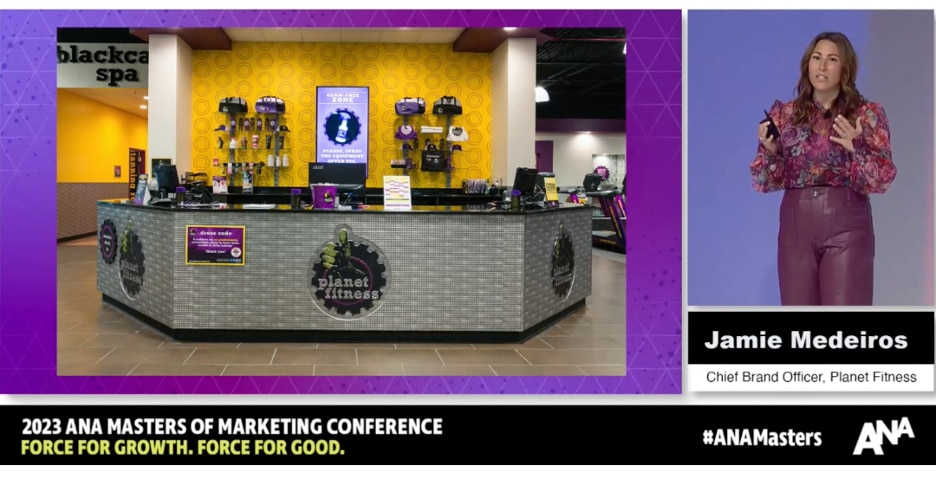Discover the art of connecting with your audience through customer pain points. Learn from Planet Fitness at ANA 2023. Join us!
Delivering a powerful message sometimes means owning your customers’ pain points. That’s a big lesson I learned from Planet Fitness’s presentation at the 2023 ANA Masters of Marketing conference, delivered by Planet Fitness Chief Brand Officer Jamie Medeiros and Katy Hornaday, chief creative officer of Planet Fitness’s agency partner Barkley.
About Planet Fitness
Medeiros and Hornaday provided some context about the company’s story. Planet Fitness was founded in 1992 in New Hampshire with a goal of providing a fitness club that is affordable and welcoming to everyone, regardless of their fitness level. In the early 2000s, Medeiros joined the company on the ground floor as a receptionist at one of its clubs, and she has personally been part of its transformation into a business with 18 million members.

This is all the more amazing because during the depths of the COVID-19 pandemic in 2020, the company was forced to close all its locations. By early 2023, Planet Fitness reported that its membership numbers had recovered to pre-pandemic levels!
How has Planet Fitness succeeded despite its ups and downs? One major factor: owning its core message of being a Judgement Free Zone.
No Judgement
As Medeiros explained, “We have fueled our growth by focusing on the 80 percent – consumers who have not joined gyms because they perceive of barriers to joining a gym, such as fear of being intimidated by unbelievably trim fitness geeks.” Time and again, Planet Fitness courts people who are intimidated by the possibility of being judged when they walk into a gym. Generation after generation of consumers share this common fear.

Planet Fitness has responded to those fears with its messaging, such as positioning itself as a Judgement-Free Zone with friendly team members who know how to help consumers overcome intimidation
Picking a Fight
What really impressed me is how Planet Fitness has leaned into the Judgement Free Zone message by consistently doubling down and having the courage to “pick a fight.” As Medeiros said, “Most companies focus their message on the positive aspects of their brand — not the enemy of their brand. But we’ve found that when we emphasize and personify enemies of fitness, we name the issues. We show our customers what they fear and respond to it. Consumer can understand Planet Fitness as a solution.”
For example, recently Planet Fitness launched a digital campaign, #STOPtheBULLFIT. Thus was designed to encourage people to be more accepting of their bodies and to stop feeling like they need to achieve an unrealistic standard of beauty.

#STOPtheBULLFIT included thought leadership about common myths about fitness. The company’s research on the topic was distributed online via content such as infographics and an owned/earned media strategy that included PR and social media. The campaign also featured a series of videos of people of all shapes and sizes talking about their own fitness journeys. The videos were honest and inspiring, and they resonated with many people.
The #STOPtheBULLFIT campaign was a success. It generated over 1 billion impressions on social media and reached over 100 million people. The campaign also helped to increase brand awareness for Planet Fitness and to position the company as a leader in the body positivity movement.
To be sure, the success of the campaign had a lot more to do with the core approach of naming a customer’s fears. It wasn’t enough to focus on a message about inclusivity. The message needed to be delivered effectively, and Planet Fitness did just that.
The #STOPtheBULLFIT videos were well-produced and engaging. They featured real people with real stories, and they were relatable to many viewers. The campaign was also well-timed. It launched at a time when the body positivity movement was gaining momentum. And, the campaign was well-executed. Planet Fitness used a variety of social media platforms to reach its target audience, and it also partnered with influencers to promote the campaign. As a result, Planet Fitness helped to change the conversation about body image and to make fitness more inclusive and welcoming to everyone.
Evolving a Message
Planet Fitness has done something else: read the room and adapted. Post-pandemic, Planet Fitness responded to a growing societal focus on improving mental health. So, the company began promoting the mental health benefits of fitness more proactively.

For example, the company’s website discusses the mental health benefits of fitness such as how exercise can improve mood, reduce stress, and boost self-esteem. Planet Fitness also regularly shares articles and social media posts about the mental health benefits of exercise.
Crucially, Planet Fitness has been promoting itself as a Judgement Free Zone for years. So, the company does not come across like it is chasing contemporary trends by focusing on mental health. Planet Fitness is authentic.
My Take-Away
You don’t have to be into personal fitness to appreciate the relevance of Planet Fitness’s strategy. In the business-to-business world, companies like IDX develop marketing and communications programs by researching our customers’ pain points. Doing this is an essential step in our creative briefs. But many businesses don’t actually name those pain points in their actual MarCom campaigns. They try to address them in more subtle ways, and most certainly they keep the focus of their message on the brand, not the customer. As an industry, we can do a better job articulating our customers’ problems in order to show empathy. When we show that we understand customers, we are one step closer to connecting with them emotionally – which is what great branding is all about.
Explore our marketing solutions to learn about how IDX can help your brand develop powerful MarCom strategies with authentic messaging.
